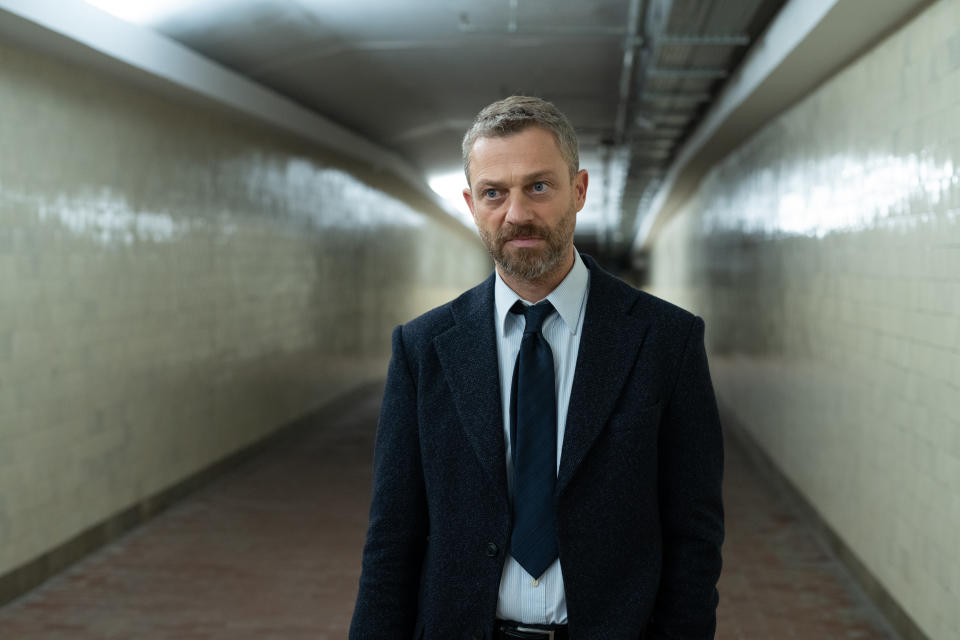Why Netflix Is Betting Big on Poland (and You Should Too)

When, earlier this year, Netflix unveiled that it had picked Poland as its new regional headquarters — the company’s new Warsaw office, set to open in late 2022, will serve as a hub for the streamer’s operations across Central and Eastern Europe (CEE) — the choice seemed obvious.
Since Netflix launched operations in Poland back in 2016, the streamer has invested more than $110 million (490 million PLN) in original series like crime drama The Woods, student comedy Sexify and popular genre fare, from period procedural Operation Hyacinth and Nobody Sleeps in the Woods Tonight (billed as the world’s “first Polish slasher movie”) to crime biopic How I Fell in Love With a Gangster and sexy NSFW franchise 365 Days — whose latest entry, 365 Days: This Day, dropped on the service April 27.
More from The Hollywood Reporter
'The Crow' Director Alex Proyas Prepping $35M Horror-Thriller 'Sister Darkness'
Taiwan's Screen Industry Booms as Streamers Provide Global Platform
“Poland has become a key market for Netflix in the CEE region,” said Anna Nagler, the streamer’s director of local-language originals for CEE, claiming that the company’s production investment has created at least 2,600 jobs in the country. “Given the growing volume of original Polish content, now is the right time to get even closer to our members and creative partners. The Netflix office in Warsaw is a natural next step in establishing new partnerships, deepening existing ones and creating new opportunities for the Polish creative community.”
Netflix’s stock nosedived after the company shed some 200,000 subscribers in the first quarter of the year, with the U.S. seen as an increasingly competitive and mature market for the company. That means that international territories and local-language production are becoming even more important to the global streamer’s growth plans.
“We are planning further investments both in Polish productions and in licensed titles,” Larry Tanz, Netflix’s vp series for EMEA, wrote in a blog post. “With an office on the ground, our presence in Poland and CEE will become even more visible.”
Late last year, Netflix unveiled 18 new Polish film and TV projects, which range from Leszek Dawid’s mountain climber drama Broad Peak and near-future catastrophe film The Hive from director Mateusz Rakowicz to horror title Hellhole from Nobody Sleeps in the Woods helmer Bartosz M. Kowalski.
With a population of around 40 million people, and a GDP of $674 billion last year, Poland is by far the biggest, and richest, country in the CEE and, by most measures, has the strongest film and TV production industry of the region. Hungary, Romania and the Czech Republic are world leaders when it comes to servicing big-budget international productions, but none of the surrounding territories come close to matching Poland for homegrown content, both for the big and the small screen.
Polish cinema is broad and deep, including mainstream blockbusters from directors like action king Patryk Vega (Pitbull, Petla) and Maria Sadowska, whose Girls From Dubai, a sex-and-crime tale about an ambitious girl who gets in over her head as a high-price escort to Arab sheiks, was Poland’s top-grossing local-language film of 2021, earning more than $6 million in the country.
Internationally, Poland is best known for its auteurs, such as Jerzy Skolimowski, who returns to the Cannes competition for the sixth time this year with EO, a Polish-Italian production described as a donkey’s view of modern Europe that stars Sandra Drzymalska and Isabelle Huppert, along with a donkey. Agnieszka Smoczynska, whose Fuga won the Critics’ Week grand prize in 2018, returns to Cannes with her English-language debut Silent Twins, starring Letitia Wright and Jodhi May, which will screen in the festival’s Un Certain Regard section.
The prolific Malgorzata Szumowska, whose Never Gonna Snow Again, a co-directing effort with longtime collaborator Michal Englert, debuted in Venice in 2020, also switched to English for her latest, the survival drama Infinite Storm, starring Naomi Watts. Even Vega, the most commercially successful Polish director of the past decade, plans to move into English-language features, saying his upcoming feature Autobiography will be his last project in Polish. Despite his local success, Vega sees English as the only way to crack the global market and move into bigger-budget productions.
Many Polish producers agree that there can be a limit to just how big one can get in the country.
“In Poland, there are hardly ever enough funds to produce a period piece,” says Anna Wasniewska, head of the feature film team at Warsaw-based TVN Discovery. “Films set in the ‘70s or ‘80s, like [TVN’s upcoming] Doppelganger by Jan Holoube, or ‘40s war-time dramas, aren’t easy to get made. Polish big-budget period dramas are a rare thing.”
“The easiest films to shoot in Poland are those set in modern times without extensive set design, special effects or period costumes,” says Robert Kijak, CEO of Next Film.
While Kijak sees opportunity in new investment in Polish content from the likes of Netflix — “Polish films have been very well received by international audiences [and] streaming companies have increased funding for local productions,” he notes — the influx of capital has also increased demand for talent.
“Production costs, the costs of film crews and talents have gone up about 30 percent,” says Wasniewska, “both because of inflation and because of the increase in the volume of films and series being produced by the streamers.”
A new Polish law requiring streaming services to contribute 1.5 percent of their local revenue to the Polish Film Institute — cash that will be pooled and dolled out to future Polish projects — should help local producers feeling the pinch.
“The compulsory VOD contribution provides the PFI with robust funding, which was particularly important during the COVID-19 pandemic when theatrical revenues declined significantly,” says Dariusz Jablonski, CEO of Apple Film Production, one of Poland’s first indie production companies, who calls the law “mutually beneficial” to streamers and local producers.
Also helping to bring down producers’ budget lines — as well as encouraging more international shoots to come to Poland — is the country’s 30 percent tax rebate. First introduced in 2019, the rebate finally puts Poland on an even playing field with its more tax-generous Central European neighbors.
“Since its introduction, the cash rebate has brought tens of millions of dollars to Poland, which would not have been spent in Poland otherwise,” notes Violetta Kaminska of Apple Film. “Poland [is now] high on the list of foreign producers and companies. Our last two production services jobs were on the Dutch series Legacy and a German film. We’re about to start prep on another big-budget production.”
Joanna Szymanska, a producer at Shipsboy (Operation Hyacinth), says that since the rebate came into effect she has used it for “all of our productions, co-productions and services,” including the Germany-Luxembourg-Poland co-production Mission Ulja Funk, a family adventure film from German director Barbara Kronenberg about a 12-year-old astronomy geek who travels across Eastern Europe to monitor the impact of an asteroid. “Thanks to the rebate, we convinced the producers to make it a co-production rather then a service production. We hired Polish crew, used Polish locations. The film premiered at the 2021 Berlinale, so it clearly was a good decision.”
But Szymanska notes that certain restrictions, including spending limits for co-productions that use the rebate, and lengthy application and approval procedures make it harder for more productions to access the rebate in a timely fashion and properly cash flow their films.
Whatever the logistical headaches, the increasing investment in Polish content and the growing appetite for Polish films and TV series internationally can only be good news for local producers and anyone looking to do business with them.
Netflix Films in Pole Position
Made-in-Poland films and series, covering everything from crime to Christmas, have hit it big worldwide on Netflix.
Furioza

Mateusz Damiecki as Golden in Furioza. Cr. Courtesy of Netflix ©
The Cyprian T. Olencki-directed action thriller logged more than 40 million viewing hours in just two weeks since its April 4 drop on Netflix. The brutal drama, about a man forced to infiltrate an organized crime group and inform on his childhood friend, was a top 10 title among non-English movies on Netflix across 74 countries.
Nobody Sleeps in the Woods Tonight 2

Courtesy of Netflix
The sequel to the 2020 Polish slasher film hit number 3 on Netflix’s global non-English movie top 10 list, charting in 31 countries. Director Bartosz M. Kowalski follows his jump-scare bloodfest with the story of Adam, the first film’s sole survivor, who — no surprise — isn’t out of the woods just yet.
David and the Elves

Courtesy of Netflix
Netflix’s first Polish Christmas film — the story of a jaded, overworked elf who runs away to the real world, only to rediscover the magic of the season —was a global top 10 hit for Netflix three weeks in a row, scoring top rankings in Malta (No. 2) and Germany (No. 4).
The Woods

Courtesy of Netflix
The second Polish Netflix original series based on Harlan Coben’s best-selling crime novels, this cold case series, about a Warsaw prosecutor who hopes to tie a new murder to his sister’s mysterious disappearance 25 years earlier, cracked Netflix’s top 10 lists in some 40 countries, including Brazil, France, Argentina and the U.K.
Sexify

Courtesy of Netflix
A high-achieving, sexually inexperienced tech student sets out to create a new sex app to win a university competition in this dramedy series that hit the top 10 in 80 countries, ranking No. 1 outside Poland in Italy, India, Egypt and the Dominican Republic.

